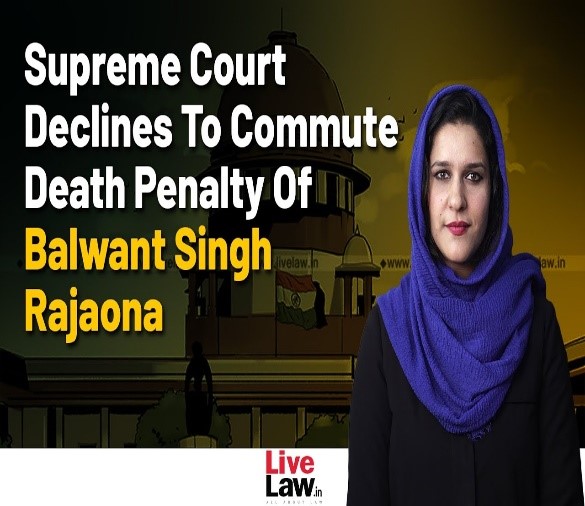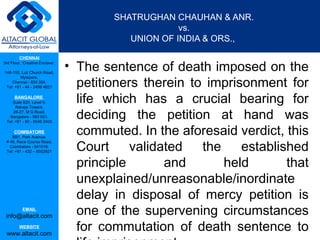- Courses
- GS Full Course 1 Year
- GS Full Course 2 Year
- GS Full Course 3 Year
- GS Full Course Till Selection
- Answer Alpha: Mains 2025 Mentorship
- MEP (Mains Enrichment Programme) Data, Facts
- Essay Target – 150+ Marks
- Online Program
- GS Recorded Course
- Polity
- Geography
- Economy
- Ancient, Medieval and Art & Culture AMAC
- Modern India, Post Independence & World History
- Environment
- Governance
- Science & Technology
- International Relations and Internal Security
- Disaster Management
- Ethics
- NCERT Current Affairs
- Indian Society and Social Issue
- NCERT- Science and Technology
- NCERT - Geography
- NCERT - Ancient History
- NCERT- World History
- NCERT Modern History
- CSAT
- 5 LAYERED ARJUNA Mentorship
- Public Administration Optional
- ABOUT US
- OUR TOPPERS
- TEST SERIES
- FREE STUDY MATERIAL
- VIDEOS
- CONTACT US
Mercy Petition
Mercy Petition


Latest Context
Recently, the Supreme Court (SC) has declined to commute the death penalty of Balwant Singh Rajoana to life imprisonment. Furthermore. it asked the Centre to decide on the Mercy Petition rapidly.
- Facts: In 1995, Balwant Singh Rajoana was convicted for the assassination of former Punjab Chief Minister Beant Singh. The argument of the petitioner was that since the state and the Union of India have not been able to decide on the mercy petition for more than 10 years, the death penalty should be commuted to life imprisonment.
Supreme Court Observation
- National Security: The court stated that the Home Ministry's conclusion that a decision on the mercy petition now would compromise national security.
- Jurisdiction of Home Ministry: The court has observed that it is not up to the court to "delve" on the Ministry's decision to defer a decision on the clemency plea. The court said that the Ministry's call to postpone its decision is based on various reports that indicate any decision on a mercy plea could create a law-and-order problem. Therefore, the Home Ministry’s decision on the mercy petition actually amounted to declining the plea for the time being.
Mercy Petition 
- Conceptual Framework: It is a formal request made by someone who has been sentenced to death or imprisonment seeking mercy from the President or the Governor, as the case may be. This idea is followed in many countries such as the United States of America, the United Kingdom, Canada, and India. Everyone has the basic right to live. Part III titled Fundamental Rights of the Indian Constitution makes special provisions for the right to live.
- Constitutional Framework: A mercy petition to the President is the last constitutional way a convict can take when he is sentenced by a court of law. A convict can send a mercy petition to the President of India under Article 72 of the Constitution of India. In the same way, the power to grant pardon is conferred upon the Governors of States under Article 161 of the Constitution of India.
- Article 72: The President shall have the power to grant pardons, reprieves, respites, or remissions of punishment or to suspend, remit or commute the sentence of any person convicted of any offense in all cases:
- where the punishment or sentence is by a Court Martial.
- where the punishment or sentence is for an offence against any law relating to a matter to which the executive power of the Union extends;
- where the sentence is a sentence of death.
- Article 161: It provides that the Governor of a State shall have the power to grant pardons, reprieves, respites, or remissions of punishment or to suspend, remit or commute the sentence of any person convicted of any offence against any law relating to a matter to which the executive power of the State extends.
- The SC in 2021 was of the opinion that the Governor of a State can pardon prisoners, including death row ones, even before they have served a minimum of 14 years of a prison sentence.
Process of a Mercy Petition
- Procedure: There is no statutory written procedure to deal with mercy petitions. But in practice, after using all methods to get relief in the court of law, either his relative or the convict in person may submit a written petition to the President. These petitions are received by the President’s secretariat on behalf of the President and then forwarded to the Ministry of Home Affairs for their comments and recommendations.
Grounds for filing Mercy Petition
- Right: It is not a right of the prisoner. He cannot claim it.
- Conditions: It is granted on the grounds based on his health, physical or mental fitness, and his family’s financial conditions because he is the only sole earner of bread or butter or not.
Other Provisions related to Mercy
- Judicial Review: In the case of Epuru Sudhakar & Anr. v. Government of Andhra Pradesh (2006) the top court held that the clemency power of the President and Governor under Article 72 and Article 161 is subject to judicial review. It laid down certain grounds on which clemency or mercy power can be claimed by the petitioner for judicial review:
- Grounds: These are as follows:
- If the order is passed without any application of mind
- If the order is malafide
- If the order is passed on completely irrelevant considerations
- If the order has been taken arbitrarily
Important Judgments Related to Mercy Petition
- Maru Ram v. Union of India (1981): The top court held that the power to grant pardon under Article 72 is to be exercised on the advice of the Council of Ministers.
- Dhananjoy Chatterjee State of West Bengal (1994): According to the Supreme Court “The power under Articles 72 and 161 of the Constitution can be exercised by the Central and State Governments, not by the President or Governor on their own.
- Kehar Singh v. Union of India (1989): The SC had examined the scope of the President’s pardoning power under Article 72 in detail. The SC was of the view that the exercise of the pardoning power provided by Article 72, could “scrutinize the evidence on the record of the criminal case and come to a different conclusion from that recorded by the Court with regard to the guilt of and sentence imposed on the accused.
Some of the Keywords Related to Pardoning Power
- Pardon: It means totally absolving/acquittal/free the person from the offense he committed.
- Commute: To reduce the type of punishment to a less harsh one. For instance, rigorous imprisonment to simple imprisonment.
- Remission: It means reducing the punishment without changing the nature of the punishment. For instance, 20 years of rigorous imprisonment to 10 years of rigorous imprisonment.
- Reprieve: A delay is permitted in the execution of a sentence, usually a death sentence for a guilty person to prove his innocence.
- Respite: Reduce the degree of punishment by looking at specific grounds like pregnancy, old age etc.
Laws of other Countries Provide
- USA: The Constitution of America provides the President the same powers to grant reprieves or pardon for offences under Federal law except in cases of impeachment. However, in cases of violation of state law, this right of the concerned Governor of the state.
- UK: The constitutional monarch has the power of pardon or reprieve for offences on ministerial advice.
- Canada: The National Parole Board under the Criminal Records Act is authorized to grant such reliefs.
Conclusion
- Procedural Problems: It can prove to be good or curse depending on the situation and circumstances. Unnecessary hurdles and delays in approving the mercy petition can lead to severe discomfort to both the convicts and the victims. Due to these delays and hurdles, victims can never get access to proper and unbiased justice. It will further intensify the victim’s pain and suffering. It is the need of the hour for a proper limitation period and proper policies to restrict the unnecessary delay in filing and granting mercy petitions to facilitate the smooth functioning of the Indian judiciary.
![]()
Prelims:
Q. Which of the following are the discretionary powers given to the Governor of a State? (2014)
1. Sending a report to the President of India for imposing the President’s rule
2. Appointing the Ministers
3. Reserving certain bills passed by the State Legislature for consideration of the President of India
4. Making the rules to conduct the business of the State Government
Select the correct answer using the code given below:
(a) 1 and 2 only
(b) 1 and 3 only
(c) 2, 3 and 4 only
(d) 1, 2, 3 and 4
Ans: (b)
Mains
Q. Discuss the essential conditions for the exercise of the legislative powers by the Governor. Discuss the legality of re-promulgation of ordinances by the Governor without placing them before the Legislature. (2022)



